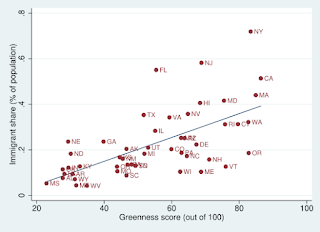Intelligence, Religiosity, and the Environment
In a paper published in the Eastern Economic Journal, I analyzed the link between IQ, religiosity, and greenhouse gas (GHG) emissions at the U.S. state level.
Previous research has established that religiosity is associated with negative attitudes toward the environment. Negative correlation has also been established between intelligence and religiosity and between intelligence and environmental outcomes.
The rationale behind my hypotheses is that the association between intellect and environmental emissions may be moderated by religion. This theory is based on the expectation that intellectual people’s capacity to act in favor of the environment might be hampered by religiosity, which manifests in a tight adherence to religious doctrine and beliefs.
Result # 1
The relationship between IQ and religiosity is negative and unidirectional flowing from IQ to religiosity.
Result # 2
There is no evidence of an association between IQ and GHG emissions.
Result # 3
The relationship between religiosity and GHG emissions is negative.
Result #4
Higher-IQ states have lower GHG emissions when the religiosity rate is below approximately 55.64% and have greater GHG emissions for rates of religiosity beyond that threshold.
The positive link between IQ and GHG emissions becomes more pronounced as religiosity increases beyond the 55.64% threshold.
Result #5
Highly religious states are found to have greater GHG emissions when IQ is above 95.85 and this link becomes even more pronounced as IQ increases beyond this threshold.
This seemingly counterintuitive finding may be connected to the Functional Equivalence theory, which posits that religiosity and intelligence can be functionally equivalent because they fulfill the same individual needs. Both are thought to enable people to demonstrate self-regulation, attachment, compensating control, and self-enhancement. As a result, they complement one another, covering for each other’s shortcomings in delivering answers to individuals about the meaning of life.
Therefore, as IQ rises, there is less of a need for religion, which in turn helps to reduce GHG emissions. The positive relationship between religiosity and GHG emissions grows stronger with IQ, suggesting that as religiosity declines because it is no longer necessary, the advantages of higher IQ become more apparent in the faster pace at which GHG emissions are reduced.
Result #6
At the individual level, based on General Social Survey data, the following are interesting insights:
Older people are less likely to believe that the greenhouse effect is harmful to the environment but more likely to say that they do what they can to protect it.
People with greater levels of education are more likely to say they do their part to protect the environment, to be willing to pay more taxes to do so, and to think that the greenhouse effect is harmful to the environment.
Higher-paid individuals are less likely to say that they take action to protect the environment.
The idea that the greenhouse effect is harmful to the environment is more likely to be rejected by men than by women.
Republican-leaning survey respondents are less likely to say they take action to protect the environment, more likely to say they have no concern for the environment, more likely to say they would not be willing to pay higher taxes to protect the environment, and more likely to believe that the greenhouse effect poses no threat to the environment at all.
Social conservatism and religious socialization are typical characteristics of very religious households. For instance, parents have a significant impact on their children’s development of religious identity and associated views and attitudes. Religious reality is socially constructed with the introduction of symbolic references to children through stories in the home and classroom. Religious behavior and attitudes are then further enforced and shaped along the norms and expectations of a particular religious group.
Such views are most stable when people are committed to preserving close relationships and connections with other people who have similar beliefs. Therefore, it is expected that the solid community ties developed within religious communities will foster a sense of belonging as well as a climate of devotion and commitment to a certain ideology and attitudes. People would have a strong incentive to align their viewpoints and attitudes about the environment with those of the group if they continued to identify with that particular religious organization.
Given that 90 percent of conservative Americans place a high value on religion, it is likely that religion, especially among intelligent groups, plays a significant part in the denial of climate change.
Religious socialization is certainly not unique to one particular religion. It is performed by almost all major religions since it is crucial to the survival of a certain religious group. Thus, religious socialization is a crucial shared factor that influences religiosity. Such socialization is anticipated to have a significant role in monotheistic faiths, especially in preventing adherents from developing independent perspectives and behavior, such as those regarding the environment.
How can one internalize the external cost of religion?
It is impossible to consider religion as a single, independent factor. For instance, it is typically correlated with republican party membership, and given that both of these indicators are linked to unfavorable attitudes about the environment, addressing just one of them would be futile.
According to some research, social ideology rather than heredity plays a larger role in the relationship between religion and political ideology.
In conclusion, the development of religion is unmistakably the product of a sophisticated process that begins in early life and is sustained throughout an individual’s lifetime at the household and communal levels. Therefore, minimizing its potential environmental impact needs a thorough understanding of how belief systems form, persist, and break down.


Comments
Post a Comment